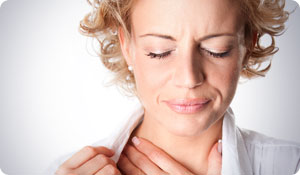
See what people are saying about this article on our Facebook page!![]()
Even though you shouldn't have had that spicy Mexican enchilada or that extra cup of coffee, you actually don't feel too bad afterwards-at least not right away. But hours or even a day or two later, you feel those familiar and terrible symptoms of reflux coming on and heartburn brought on by reflux is plaguing you once again.
"When you have patients with delayed gastric emptying who feel the effects of reflux long after eating, they are considered to have delayed reflux," says Lisa Ganjhu, MD, DO, a gastroenterologist at Saint Luke's-Roosevelt Hospital in New York City.
Typically, heartburn comes on right after a heavy meal. "Usually, the symptoms are immediate," Ganjhu says. "But there are people with delayed symptoms."
Reflux occurs when food in the stomach backwashes, or comes back up, explains Anthony A. Starpoli, MD, director of esophageal endotherapy at Lenox Hill Hospital in New York City. Symptoms can range from a burning sensation in the chest (most common) to hoarseness, voice strain, a cough and even asthma, he says.
"Unfortunately, most reflux is chronic and relapsing," Starpoli says. "It comes and goes. And it's often a person's dietary habits that cause it."
Both delayed and chronic heartburn can wreak havoc with a person's sense of well being. Fortunately, help is at hand-even for individuals who may not experience symptoms right at the end of a meal.
Here's how to minimize and alleviate delayed heartburn symptoms:
- Keep a food diary. Record everything you eat and drink and how you feel afterwards. Do this for at least several days, urges Ganjhu, and you'll most likely see a pattern that will help you distinguish foods that make you hurt versus foods that don't. "Sometimes garlic has a delayed reaction," she says. "Some people have to look back in their food diary a couple of days to see what might be triggering the symptoms."
- Cut out alcohol, late-night meals, fatty foods and all coffee products, including decaf coffee, Starpoli recommends.
- Stress is a definite trigger for heartburn, Ganjhu says. Take a long, hard look at your lifestyle and do what you can to lower your stress level.
- Chew your food slowly and carefully, eat smaller meals and eat meals that are low in fat, Ganjhu suggests.
- If you find yourself with symptoms, there are many over-the-counter medications that can help neutralize stomach acid. Or try a low-tech home remedy. "A piece of bread or a glass of milk may be all you need," Ganjhu says.
- If all else fails, your doctor may prescribe one of the proton pump inhibitors (PPIs) to help. "These drugs lower the acid so much that you have a lot more discretion in terms of your diet," Starpoli says. But with lifestyle changes, like diet and exercise, these hopefully won't be necessary in the long term.
See what people are saying about this article on our Facebook page!![]()





